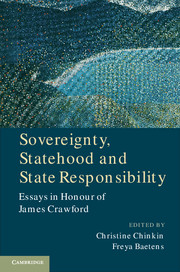Editors’ preface
James Crawford has been a towering figure in international law and practice over the past decades, in universities (primarily in his native Australia and the United Kingdom), in international, regional and national courts and tribunals and in governmental (national and international) bodies. He has performed multiple roles in each of these sites: scholar, teacher, supervisor, dean, college fellow and director of a research centre; advocate, expert witness and arbitrator; and law reform commissioner in Australia and on the International Law Commission. His energy and work rate are legendary. He has given his time and expertise to non-governmental organisations, for instance as Director of Studies of the International Law Association. He has also received multiple honours including honorary doctorates, being elected a Fellow of the British Academy and, most recently, Companion in the General Division of the Order of Australia.
James’s publications make clear that his academic research and writing interests are both prolific and range widely, especially across public international law, private international law and constitutional law. James is not associated with any ‘school’ of international law; rather, his commitment is to international law as an ‘open system’, a practical tool for the resolution of often apparently intractable international problems. But he is also ‘open’ to diverse theories and methodologies of international law, traditional positivist approaches as well as historical, interdisciplinary and critical work – as is evident from even a brief look at the contents of the co-edited (with Martti Koskenniemi) Cambridge Companion to International Law. In an era of international legal specialisation, James is a ‘generalist’ who has illuminated foundational concepts of international law: sovereignty, States, statehood, territory, self-determination, State responsibility. But he is also a specialist, for as is said by one of the contributors to this volume, no one can be a specialist without first being a generalist. Unsurprisingly, the range of topics chosen by contributors for their doctoral work under James’s supervision is great. The constraints of commercial publication did not allow us to give a free hand to contributors, reflecting their past and current academic interests. Instead we sought to bring together a volume that reflects upon three concepts that have pervaded James’s work over the past four decades and where he has made an outstanding intellectual contribution: sovereignty (the unique, intangible and yet essential characteristic of States), statehood (what it means to be(come) a State; the process of acquiring, or losing, statehood) and State responsibility (the legal component of what being a State entails). The unifying theme between these topics – apart from James’s seminal work on each of them – is that they have always been, and will in the future continue to form, part of the foundation of public international law.
This volume is a tribute and token of gratitude to James Crawford on his retirement from academia in one of his many roles, that of doctoral supervisor and thus as scholar and mentor, rather than practitioner. All the contributors to the volume were former doctoral candidates under James’s supervision at the law faculties at the University of Sydney and the University of Cambridge and are now themselves active in legal academia, in international legal practice, or both – hence its appellation as a Liber Doctorandorum.
We thank the authors for their contributions to the volume. We also give a special thank you to Elina Zlatanska and Sophie Starrenburg for their invaluable research and editing work which assisted us in finalising the volume. We also thank Cambridge University Press, and especially Finola O’Sullivan for her support and enthusiasm for this project.

